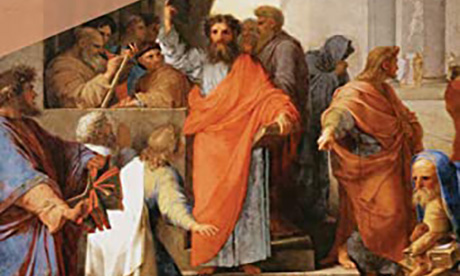Whenever there is a matter of dispute in the modern-day Church, there is a tendency to ask what would be the opinion of those members of the Early Church?
Those of you already familiar with the writing and teaching of Tom O’Loughlin, Professor Emeritus of Historical Theology at the University of Nottingham, will welcome his new book.
Tom and I share a friendship over many years and both our professional lives have been spent teaching, although in vastly differing fields.
I have come to this book as a layman whose familiarity with theological background is nowhere near that of Tom’s. Nonetheless, I have found it to be a fascinating read.
The title answers the question about the Early Church.
There wasn’t a singular source from which all teaching grew in a linear fashion but a multitude of communities or Churches that carried the Christian memory forward. The first two centuries were formative and would not have been recognizable to us today.
O’Loughlin quotes Johann Metz “Christianity in not really a Community that interprets and gives arguments but rather a Community that remembers and tells stories”. (p48)
We have such a memory in the text known as the Didache which is the oldest text we have that describes the practice and pattern of early Christian life. O’Loughlin, who produced his own translation of this short book a while ago, makes frequent reference to it in this text
These Church groups varied in size, some being as small as house communities.
It was to these varied groupings that the early scriptures, what we now call the New Testament, were read and from which they derived their teaching.
Even these scriptures, attributed to one writer, have varied authorship, for when Paul was speaking, others were listening often who were in awe of Paul transcribed his words and so produced a text in the style of Paul.
We also discover that Discipleship is about learning and discovering within a Community.
“Discipleship is very much a matter that can be located within one’s calendar. This is service to one another: feeding, clothing, healing and helping. Moreover, it is not just to the known few, or the circle of other disciples, it reaches out like the divine love to all humanity”. (p99)
We must recognize the difference between those times, heavily influenced by the Graeco-Roman structure and tradition and our own time.
“Christianity must have appeared a poor rival for the affections of a religiously minded gentile in that world”. (p97)
Gathering around a common table, not an altar, was a key aspect of those early Christian churches for “…one of the key scenes within the memory of Christians is the supper of Jesus with the disciples that took place just before his arrest and death”. (p81)
It is ironic and sad that this Common Table has become a point of dissension amongst Christians today when it was clearly meant to be otherwise.
So the meal was the centre-piece of the gathering, the sharing of food, one with another, crossing the boundaries of class and nationality.” …to be a disciple meant knowing that meals were important in disciples’ memory and that the last supper was but the high point in the memory of the meals of Jesus”. (p82)
An understanding of these Early Churches and their patterns of understanding and practice would go a long way toward easing some of the stresses that we face in our Christian communities today.
This book has been a welcome challenge to read, respecting the perspective of the writer, and his depth of understanding of his subject.
Having read it once, it now requires a return in the hope of discovering further insights into the practice of the Early Churches.
- Chris McDonnell is a retired headteacher from England and a regular contributor to La Croix International.
